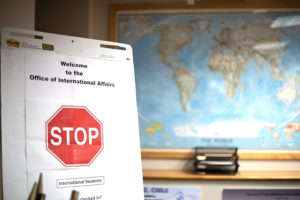
The Office of International Students and Scholars reached out to Iranian students following reports of President Trump considering placing travel restrictions on more countries. The Office of International Students and Scholars provides support for all international students at Lehigh throughout the year. (Jessica Mellon/B&W Staff)
The Trump administration is considering placing immigration restrictions on seven new countries, three years after its executive order in September 2017.
The nations under discussion for the expanded measure include Belarus, Eritrea, Kyrgyzstan, Myanmar, Nigeria, Sudan and Tanzania. Currently, the executive order in place limits or bars travel from Iran, Libya, Somalia, Syria and Yemen, as well as Venezuela and North Korea, the majority of which have a Muslim-majority population.
Henri Barkey, an international relations professor, said this potential travel ban expansion is part of President Donald Trump’s overall policy to reduce immigration.
Barring immigration from these specific countries primarily affects people who desire to legally immigrate to the United States, Barkey said. The vast majority tend to travel via aircraft, something that is relatively easy to control.
“They are coming here to become American citizens and, presumably, this is something that you would welcome,” Barkey said. “The people who tend to immigrate, especially when coming from across the sea, tend to be the best and the brightest…so it’s a loss for the U.S.”
As of fall 2019, there are 1,555 international students studying at Lehigh, 430 of which are undergraduates, according to a report from the Office of International Students and Scholars. The highest-represented countries are China, India, and Iran who have 630, 73, and 31 students, respectfully.
Samba Dieng, the director of the Office of International Students and Scholars, said there has been an overall drop in the enrollment numbers of international students over the last three years, led by a 17 percent decrease in graduate students since 2015. There has, however, been a gradual increase in the number of international undergraduate students in the same timeframe.
“I am not saying that this drop should be attributed to the travel ban or current administration,” Dieng said. “Students are beginning to find themselves having more options.”
Dieng said countries like China are beginning to welcome more international students. China is currently the second-most popular destination for international students from Africa, a position that the United States had held until recently, he said.
In response to the increasing tensions between the United States and Iran, the Office of International Students and Scholars sent an email to Iranian students extending its support and offering them resources.
He said as of now, no students have reached out to discuss their uneasiness toward current American policies regarding immigration, but believes some international students still may feel uncomfortable.
“It could be unnerving to be a foreign national to a place like Iran and to find yourself in the middle of diplomatic feuds between the U.S. and your home country,” Dieng said. “It would be unnerving to anybody.”
Hassan Al Khawaldeh, ‘21, is an international student from Jordan. He had visited the United States prior to choosing where to attend college and was certain that he wanted to go to school in the U.S.
He said he has not felt different or uncomfortable being an international student, despite increasing regulations against immigrants and increasing tension in the current political climate.
“I am still very happy that I chose to (attend university) in the U.S. rather than anywhere else,” he said.
Barkey said that if President Trump is re-elected, it is likely that restrictions on immigration policies will continue.
In a country like the United States, where the growth in population is leveling off, immigrants are important to a growing economy, he said.
“Immigrants tend to be hard workers and therefore, by increasing immigration restrictions, the U.S. is losing out,” Barkey said.






Comment policy
Comments posted to The Brown and White website are reviewed by a moderator before being approved. Incendiary speech or harassing language, including comments targeted at individuals, may be deemed unacceptable and not published. Spam and other soliciting will also be declined.
The Brown and White also reserves the right to not publish entirely anonymous comments.
2 Comments
“The highest-represented countries are China, India, and Iran who have 630, 73, and 31 students, respectfully.” ?respectively? This quote and “Dieng said countries like China are beginning to welcome more international students. China is currently the second-most popular destination for international students from Africa, a position that the United States had held until recently, he said.” remind me of a recent editorial that linked Chinese students to industrial espionage and others that tout China’s aims to gain political influence in Africa. It is not hard to find these ideas believable given other actions of the Chinese government. Unlike America they have a good idea of what direction they want to go.
““They are coming here to become American citizens and, presumably, this is something that you would welcome,” Barkey said. “ I would like to see statistics showing what percentage of students accomplish this. What it means to be an American citizen is legally clear but is becoming increasingly difficult to find consensus as to what it should look like in action. Diversity is a fact that can be beneficial or harmful depending on how it is manifested. Solidarity can likewise be good or bad.
“…the majority of which have a Muslim-majority population.” The reason for this is undoubtedly US experience with radical Muslims and concern that conservative Islam seems to be incompatible with Christian/western (either or both) values. Radical Hinduism seems not to have made inroads into the US.
Educational institutions undoubtedly desire foreign students as a source of income as well as their potential as motivated students.
Sadly, Trump’s contentious issue is yet one more thing that makes being an international student away from home difficult, compounded by our complex culture and language problems. Welcoming and assimilation assistance must come from numerous sources, including the White House, to aid these young people embarking on life’s journey.
Most struggle in their efforts and need guidance from schools’ international departments, immigration protection, host families, concerned neighbors and fellow students, and even informative books to extend a cultural helping hand.
Something that might help anyone coming to the US is the award-winning worldwide book/ebook “What Foreigners Need To Know About America From A To Z: How to Understand Crazy American Culture, People, Government, Business, Language and More.”
Used in foreign Fulbright student programs and endorsed worldwide by ambassadors, educators, and editors, it identifies how “foreigners” have become successful in the US, including students.
It explains how to cope with a confusing new culture and friendship process, and daunting classroom differences. It explains how US businesses operate and how to get a job (which differs from most countries), a must for those who want to work with/for an American firm here or overseas.
It also identifies the most common English grammar and speech problems foreigners have and tips for easily overcoming them, the number one stumbling block they say they have to succeeding here.
Good luck to all at Leigh or wherever you study or wherever you come from, because that is the TRUE spirit of the American PEOPLE, not a few in government who shout the loudest! Supporters of int’l students must shout louder.